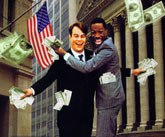Yes, Commodities Trading Used To Be Exactly Like ‘Trading Places’
 The Consumerist staff are children of the ’80s who write about business and finance, and 25% of us are from Philadelphia, so naturally we love the movie “Trading Places” a little more than the average person. But does it accurately portray the world of commodities trading? People can’t possibly make their fortunes selling frozen concentrated orange juice futures…right? Well, no. They can.
The Consumerist staff are children of the ’80s who write about business and finance, and 25% of us are from Philadelphia, so naturally we love the movie “Trading Places” a little more than the average person. But does it accurately portray the world of commodities trading? People can’t possibly make their fortunes selling frozen concentrated orange juice futures…right? Well, no. They can.
The cool people over at NPR’s Planet Money are always asking questions that we never thought to ask. They recently interviewed commodities traders to solve the 30-year-old mystery of whether the capitalist frenzy that the film portrays is realistic. The short answer: yes.
Frozen concentrated orange juice trading is actually a thing. Traders don’t pull up with carts full of little metal cans. Instead, they trade contracts that state they’ll deliver a certain amount of orange juice (15,000 pounds at a time, not in little cans) at the agreed-upon price.
Here’s a refresher if you haven’t seen the movie in a while, and some spoilers if you’ve never seen it. (You should. It has aged better than most ’80s movies, and is available streaming on Netflix and Amazon Prime. You can usually find a copy in the discount DVD bin at Walmart.) Two rich jerks, the Duke brothers of Philadelphia, decide to mess around with the lives of two men in order to settle an argument. They orchestrate the downfall of one of their employees, Louis Winthorpe III, played by Dan Aykroyd. They take his entire life–job, fancy apartment, and all–and hand it over to a particularly bright con man they find on the street: Billy Ray Valentine, played by Eddie Murphy. The privileged trader gets everything taken away and ends up living on the street.
Valentine immediately sees the commodities traders for what they are: really rich bookies. He and Winthorpe meet, figure out what happened, and plot their revenge on the brothers. The brothers planned to make a lot of money in the frozen concentrated orange juice market by getting early crop reports from the government through nefarious means. The revenge squad sneaks a forgery in its place and uses the information from the real report to make a fortune of their own and ruin the brothers.
How? The fake report forecasted bad crops, and the Duke brothers bought up every ounce of orange juice they could find at any price, hoping to later corner the market and sell it at a premium once other traders learned about the crop failure. Other traders followed their lead, driving up prices. Meanwhile, Winthorpe and Valentine were selling orange juice futures at those inflated prices, knowing that when the time came to deliver on the contracts, they’d be able to pick up dirt cheap orange juice elsewhere once the real crop report came out and prices fell. They shorted the FCOJ, ruining their bosses.
This is all very nice in a movie, because the rich jerks get their comeuppance and hearing everyone say “frozen concentrated orange juice” over and over again is really funny. What’s surprising that it’s also pretty realistic. Planet Money interviewed real traders who say that yes, the action is surprisingly accurate, people really do trade huge quantities of frozen OJ, and people really could be financially ruined by making bad bets on margin (credit) as the Duke brothers do in the movie.
One of their experts points out that part of the reason no one really makes good Wall Street movies anymore is that a modern version of Trading Places wouldn’t have traders jostling and yelling in the basement of the World Trade Center: the action would be a bunch of guys and gals tapping away at computers, like any other American office. Yawn.
Here’s the interesting thing: this kind of insider trading based on ill-gotten unreleased government information wasn’t illegal in the commodities market in 1983. In the stock market, sure, but not in commodities. That didn’t change until the Dodd-Frank Act of 2010, where that section of the law was called–what else?–the Eddie Murphy Rule.
Check out the Planet Money episode, which has a lot of material we haven’t covered here, and also see Trading Places if you haven’t.
Episode 471: The Eddie Murphy Rule [NPR]
Want more consumer news? Visit our parent organization, Consumer Reports, for the latest on scams, recalls, and other consumer issues.

